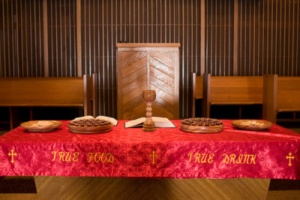On June 9, 1886, a funeral was held in a church in Lancaster, Pennsylvania. The deceased, John Williamson Nevin (1803–86), was a pastor, professor, and theologian in the German Reformed Church. Friends and family were in attendance as well as several theologians and professors of differing fame and reputation. None of this was unusual for a theologian’s funeral in nineteenth-century America. There was, however, at least one irregularity: A. A. Hodge (1823–16) gave one of the eulogies.1 Hodge’s late father, Charles Hodge (1797–1878), and Nevin were involved in one of the most prominent sacramental controversies in nineteenth-century America, yet the younger Hodge eulogized the very man who contested with his father decades before. Even now, the controversy and theologies that gave rise to it live on long after the death of the major figures. Continue reading →









